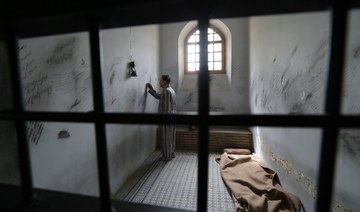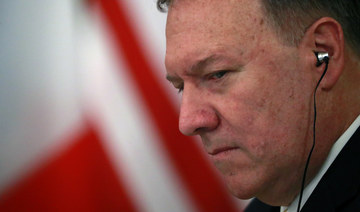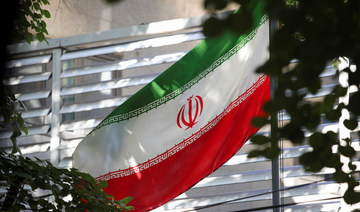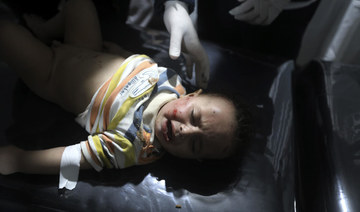TEHRAN: A Princeton scholar held for three years in Iran on widely criticized espionage charges was freed Saturday as part of a prisoner exchange that saw America release a detained Iranian scientist, a rare diplomatic breakthrough between Tehran and Washington after months of tensions.
The trade on the tarmac of a Swiss airport saw Iranian officials hand over Chinese-American graduate student Xiyue Wang for scientist Massoud Soleimani, who had faced a federal trial in Georgia over charges he violated sanctions by trying to have biological material brought to Iran.
The swap, however, had clear limits. Crushing US sanctions on Iran blocking it from selling crude oil abroad remain in place, part of President Donald Trump’s maximum pressure campaign imposed following his unilateral withdraw from Tehran’s nuclear deal with world powers last year. Those sanctions in part fueled the anger seen in nationwide protests last month that Iranian security forces violently put down, unrest that reportedly killed over 200 people.
Meanwhile, Western detainees from the US and elsewhere remain held by Tehran, likely to be used as bargaining chips for future negotiations. At least two American families of detainees, while praising Wang’s release, questioned why their loved ones didn’t come home as well.
Wang’s release had been rumored over recent days. One lawyer involved in his case tweeted out a Bible verse about an angel freeing the apostle Peter just hours before Iranian Foreign Minister Mohammad Javad Zarif broke the news in his own tweet. He posted pictures of himself with Soleimani at the Zurich airport before quickly whisking him back to Tehran by jet.
Trump shortly after acknowledged Wang was free in a statement from the White House, thanking Switzerland for its help. The Swiss Embassy in Tehran looks out for America’s interests in the country as the US Embassy there has been closed since the 1979 student takeover and 444-day hostage crisis.
“Thank you to Iran on a very fair negotiation,” Trump later tweeted. “See, we can make a deal together!”
Brian Hook, the US special representative for Iran, accompanied the Soleimani to Switzerland to make the exchange. He later posed for a photograph with Wang, who carried a folded American flag in his arms while wearing gray workout clothes.
Hook and Wang traveled to Landstuhl hospital near Ramstein Air Base in Germany where Wang likely will be examined by doctors for several days.
Wang’s wife, Hua Qu, released a statement saying “our family is complete once again.”
“Our son Shaofan and I have waited three long years for this day and it’s hard to express in words how excited we are to be reunited with Xiyue,” she said. “We are thankful to everyone who helped make this happen.”
Soleimani arrived at Tehran’s Mehrabad International Airport with Zarif, where his wife and family wrapped garlands of yellow and purple carnations around his neck. He briefly spoke to journalists from state-run media, his voice shaking and a tear running down his face under a portrait of the late Supreme Leader Ayatollah Ruhollah Khomeini.
Wang was sentenced to 10 years in prison in Iran for allegedly “infiltrating” the country and sending confidential material abroad. Wang was arrested in 2016 while conducting research on the Qajar dynasty that once ruled Iran for his doctorate in late 19th- and early 20th-century Eurasian history, according to Princeton.
Wang’s family and Princeton strongly denied the claims. The United Nations’ Working Group on Arbitrary Detention said “there was no legal basis for the arrest and detention.”
Westerners and Iranian dual nationals with ties to the West often find themselves tried and convicted in closed-door trials, only later to be used as bargaining chips in negotiations.
Soleimani works in stem cell research, hematology and regenerative medicine. He and his lawyers maintained his innocence, saying he seized on a former student’s plans to travel from the US to Iran in September 2016 as a chance to get recombinant proteins used in his research for a fraction of the price he’d pay at home.
Zarif in September said in an interview with NPR that he had pushed for an exchange of Wang for Soleimani. Speaking in Tehran on Saturday night, Zarif referred to Wang as a “spy” who received his release due to “Islamic mercy.”
It remains unclear whether this exchange will have a wider effect on Iranian-US relations. Iran has accused the US without evidence of being behind the mid-November protests over gasoline prices. The demonstrations and the crackdown reportedly killed at least 208 people, though Iran has refused to release nationwide statistics over the unrest.
Meanwhile, Iran’s Supreme Leader Ayatollah Ali Khamenei has ruled out direct talks between the nations.
A US official, speaking to journalists on condition of anonymity to discuss negotiations with Iran, suggested the maximum pressure campaign targeting Tehran would continue.
“There’s been absolutely no payment of cash or lifting of sanctions or any sort of concessions or ransom in any of these cases, and certainly not with respect to Mr. Wang,” the official said.
There had been signs a swap could be coming. In June, Iran released Nizar Zakka, a US permanent resident from Lebanon who advocated for Internet freedom and has done work for the US government. The US then deported Iranian Negar Ghodskani in September, who had been brought from Australia and later sentenced to time served for conspiracy to illegally export restricted technology to Iran.
Others held in Iran include US Navy veteran Michael White, who is serving a 10-year espionage sentence, as well as environmentalist Morad Tahbaz, an Iranian with US and British citizenship also initially sentenced to 10 years in prison.
Also in Iran are 83-year-old Baquer Namazi and his son, Siamak Namazi, dual Iranian-American nationals facing 10-year sentences after they were convicted of collaborating with a hostile power. Baquer Namazi now is on a prison furlough, said Alireza Miryousefi, a spokesman at Iran’s mission to the United Nations. However, the Namazis say he remains unable to leave Iran.
Babak Namazi, Baquer’s son and Siamak’s brother, issued a statement saying he was “beyond devastated that a second president” had left the two behind. An earlier 2016 prisoner swap as the nuclear deal took effect saw prisoners including Washington Post journalist Jason Rezaian released but not the Namazis.
Former FBI agent Robert Levinson, who vanished in Iran in 2007 while on an unauthorized CIA mission, remains missing as well. Iran says that Levinson is not in the country and that it has no further information about him, but his family holds Tehran responsible for his disappearance.
“We can’t help but be extremely disappointed that, despite all its efforts, the United States government was unable to secure his release, especially after such a painful week for our family,” the Levinson family said in a statement. “Iranian authorities continue to play a cruel game with our father’s life, and with our family. But the world knows the truth, and Iranian leadership must come clean.”
Iran frees Chinese-American scholar for US-held scientist
Iran frees Chinese-American scholar for US-held scientist

- President Donald Trump separately acknowledged Wang was free in a statement from the White House, saying he “is returning to the United States”
- Tensions have been high between Iran and the US since President Donald Trump unilaterally withdrew America from Tehran's nuclear deal with world powers in May 2018
New UK sanctions target Iranian drone industry
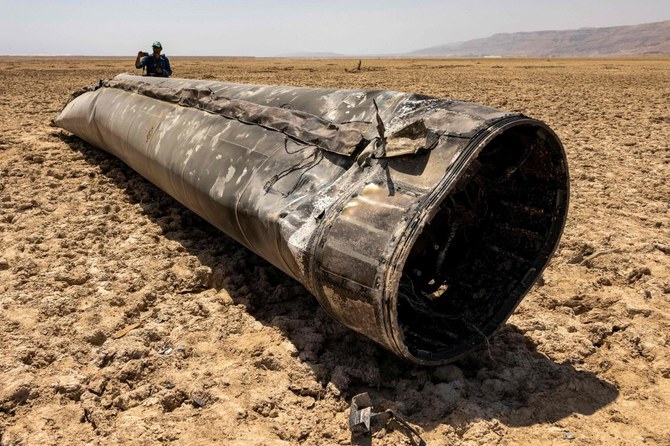
- The measures, taken in co-ordination with the US and Canada, target four businesses and two directors at a network of drone companies with the aim of limiting Iran’s ability to launch drones
LONDON: Britain on Thursday announced new sanctions targeting Iran’s military drone industry, in response to Iran’s drone and missile attack on Israel earlier this month.
The measures, taken in co-ordination with the US and Canada, target four businesses and two directors at a network of drone companies with the aim of limiting Iran’s ability to launch drones.
“The Iranian regime’s dangerous attack on Israel risked thousands of civilian casualties and wider escalation in the region,” British Foreign Secretary David Cameron said in a statement.
“Today the UK and our partners have sent a clear message – we will hold those responsible for Iran’s destabilising behavior to account.”
Britain also said it would introduce new bans on the export of drone and missile components to Iran, seeking to limit its military capabilities.
Last week, Britain imposed sanctions on Iranian military figures and organizations, in another coordinated move with the United States, following Iran’s action against Israel.
Iran launched drones and fired missiles at Israel on April 13 as a retaliatory strike for the attack on its embassy compound in Damascus two weeks prior, raising the risk of further escalation in conflict in the Middle East.
Egypt, Dutch leaders discuss Gaza ceasefire efforts

- Rafah assault ‘will have catastrophic consequences on regional peace and security,’ El-Sisi warns
- Egypt’s president and the Dutch prime minister agreed on the urgency of working toward reaching a ceasefire
CAIRO: Egypt’s President Abdel Fattah El-Sisi has discussed efforts to reach a ceasefire in Gaza with Mark Rutte, prime minister of the Netherlands.
During a phone call from Rutte on Thursday, the Egyptian leader warned that any Israeli assault on Rafah will have “catastrophic consequences” for the humanitarian situation in the enclave.
The leaders discussed bilateral relations, and ways to enhance cooperation across various political and economic levels consistent with the current momentum in Egyptian-European relations.
Ahmed Fahmy, presidential spokesman, said the call also focused on the situation in Gaza, and Egypt’s efforts to restore regional stability by reaching a ceasefire and providing access to humanitarian aid.
El-Sisi reiterated the crucial importance of ending the war, warning against any military operations in the Palestinian city of Rafah, which will have catastrophic consequences on the humanitarian situation in the strip and on regional peace and security.
The Egyptian leader underscored the need for the international community to assume its responsibilities to implement the relevant UN resolutions.
Egypt’s president and the Dutch prime minister agreed on the urgency of working toward reaching a ceasefire, and ensuring the flow of adequate humanitarian aid to all areas of the Gaza Strip in order to protect it from a humanitarian catastrophe.
They also emphasized the need to move toward implementing the two-state solution, which would restore regional stability, and establish security and peace in the region.
In March, El-Sisi received Rutte to discuss bilateral relations, regional developments, and Egypt’s efforts to reach a ceasefire and offer humanitarian assistance in Gaza.
Lebanon postpones local elections again as violence rocks south

- Lebanon is supposed to hold municipal elections every six years
- Parliament approved “extending the existing municipal and elective councils’ mandate until a date no later than May 31, 2025,” despite objections from lawmakers opposed to Hezbollah
BEIRUT: Lebanon’s parliament on Thursday delayed municipal elections for a third time in two years, state media reported, as militants in the country’s south exchanged near-daily fire with Israel for over six months.
The powerful Iran-backed Hezbollah group has been trading fire with Israeli forces across the border since the day after its Palestinian ally Hamas carried out a deadly attack on Israel on October 7, triggering the ongoing war in the Gaza Strip.
Lebanon is supposed to hold municipal elections every six years, but cash-strapped authorities last held a local ballot in 2016.
Parliament approved “extending the existing municipal and elective councils’ mandate until a date no later than May 31, 2025,” despite objections from lawmakers opposed to Hezbollah, said the official National News Agency.
The bill cited “complex security, military and political circumstances following the Israeli aggression on Lebanon” and especially its south, near the border, as reasons for the delay.
Lawmakers did not set a new date for the elections, initially scheduled for 2022.
Local councils help provide basic services to residents, but their role has declined as state coffers ran dry after Lebanon’s economy collapsed in late 2019.
Parliament Speaker Nabih Berri had previously said southern Lebanon could not be excluded from any upcoming ballot, after the Christian Lebanese Forces, the main party opposing Hezbollah, insisted on holding the polls on time.
More than 92,000 people have been displaced from their homes in Lebanon due to the violence, as have tens of thousands of residents of Israeli communities across the border.
Since violence began along the Israeli border on October 8, at least 380 people have been killed in Lebanon, including 72 civilians, according to an AFP tally.
Israel says 11 soldiers and eight civilians have been killed on its side of the border.
In April 2023, the Lebanese parliament had already postponed municipal elections as the deputy speaker warned holding them was “almost impossible” for the cash-strapped country after years of economic meltdown.
Lebanon has faced the prolonged financial crisis and months of border clashes essentially leaderless, without a president and headed by a caretaker government with limited powers amid deadlock between entrenched political barons.
Palestinian officials say Israeli forces kill teen in West Bank
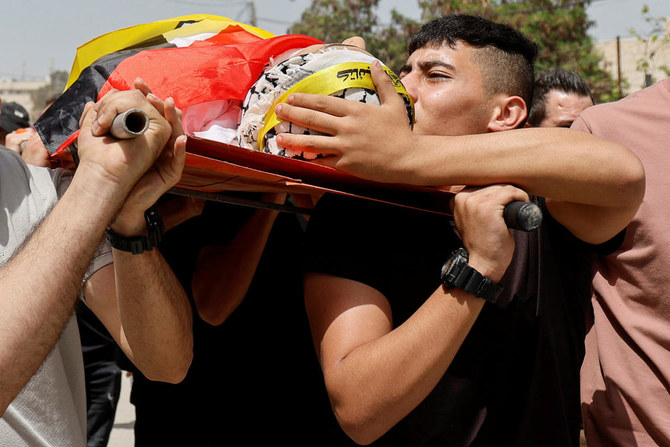
- Israeli police said “hits were identified” when forces responded to stone-throwing with gunfire
- The Palestinian health ministry said Khaled Raed Arouq was shot in the chest and “martyred by the occupation’s live bullets“
RAMALLAH, Palestinian Territories: Palestinian officials said Israeli forces killed a 16-year-old boy during a raid in the West Bank city of Ramallah early on Thursday.
Israeli police said “hits were identified” when forces responded to stone-throwing with gunfire but did not directly address the allegation.
The Palestinian health ministry said Khaled Raed Arouq was shot in the chest and “martyred by the occupation’s live bullets.”
Palestinian official news agency Wafa said Arouq died after being “shot by Israeli gunfire” early on Thursday morning.
Israeli forces carry out regular raids on towns and cities in the occupied West Bank and violence has soared in the Palestinian territory since the war in Gaza broke out on October 7.
Wafa said Israeli military vehicles stormed the city and “confrontations broke out between citizens and the occupation forces, who fired live bullets and stun grenades.”
It said Israeli forces were stationed in several neighborhoods and raided a house in Al-Bireh to the northeast.
Israeli police said: “Terrorists threw stones at the forces operating in the area, the forces responded with gunfire, and hits were identified.”
The police said they made several arrests and that Israeli forces did not suffer any casualties.
The army did not immediately respond to AFP’s request for comment.
Later on, Thursday, mourners carried Arouq’s body wrapped in the flag of Fatah, the political party of Palestinian president Mahmud Abbas, in his hometown of Jenin where he was buried.
“He was hit by a bullet in his back, which exited through his chest...They assassinated him in cold blood,” Majed Arqawi, cousin of Arouq, told AFP.
Wafa said Arouq’s father was an officer in the Palestinian military intelligence service.
Israel has occupied the West Bank since 1967 and at least 488 Palestinians have been killed by Israeli troops or settlers there since October 7, according to Palestinian officials.
At least 19 Israelis have been killed in attacks by Palestinians in the same period, according to official Israeli figures.
Hezbollah denies Israel claim it killed half of commanders in south
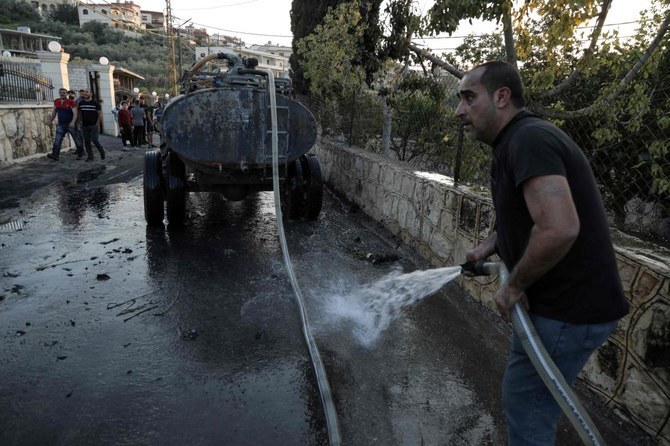
- The number of slain Hezbollah members who “hold a certain level of responsibility does not exceed the number of fingers on one hand“
- Gallant’s claim was “untrue and baseless”
BEIRUT: Hezbollah denied on Thursday an Israeli claim that it had killed half of the Iran-backed Lebanese group’s commanders in the south of the country, saying only a handful were slain.
The Lebanese group has been exchanging near-daily fire with the Israeli army since the day after its Palestinian ally Hamas carried out an unprecedented attack on Israel on October 7.
Israel’s Defense Minister Yoav Gallant said on Wednesday that “half of Hezbollah’s commanders in southern Lebanon have been eliminated” in the months of cross-border violence sparked by the Israel-Hamas war in Gaza.
“The other half are in hiding and abandoning the field to IDF (Israeli army) operations,” he added, without specifying how many.
A Hezbollah source who spoke on condition of anonymity rejected the claim.
The source told AFP that the number of slain Hezbollah members who “hold a certain level of responsibility does not exceed the number of fingers on one hand.”
The source said Gallant’s claim was “untrue and baseless” and designed to “raise the morale of the collapsed (Israeli) army.”
Israel has frequently claimed to have killed local Hezbollah commanders in targeted strikes, but the group has only confirmed a few were high-level members, referring to the rest as fighters in their statements.
Since October 8, the day after the Hamas attack on southern Israel, at least 380 people have been killed in Lebanon, including 252 Hezbollah fighters and dozens of civilians, according to an AFP tally.
Israel says 11 soldiers and eight civilians have been killed on its side of the border.
Tens of thousands of people have been displaced on both sides.
Both sides have stepped up attacks this week, with Hezbollah increasing rocket fire on military bases, while Gallant said in his latest remarks the army had carried out “offensive action” across southern Lebanon.
The Israeli military also said on Wednesday that it had struck 40 Hezbollah targets in Lebanon’s south.
Hezbollah leader Hassan Nasrallah has said his group had some 100,000 “trained” and “armed” fighters, but analysts say this number is likely inflated.




